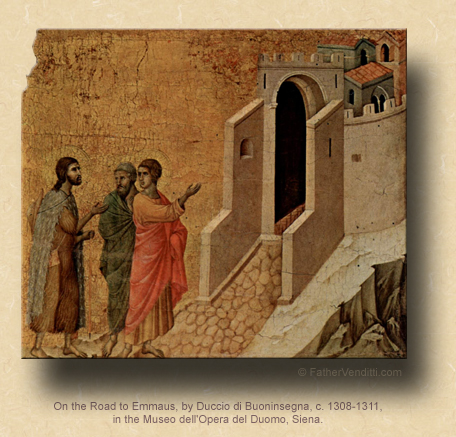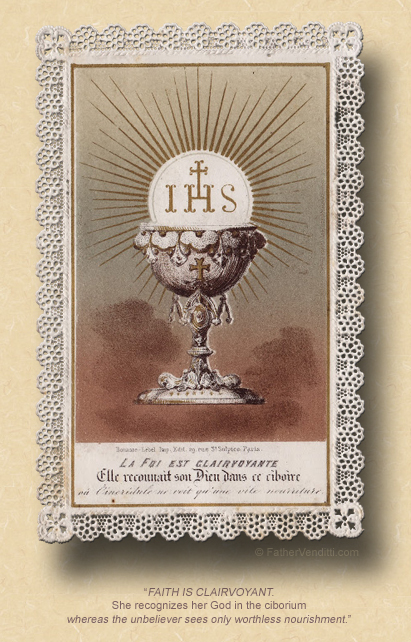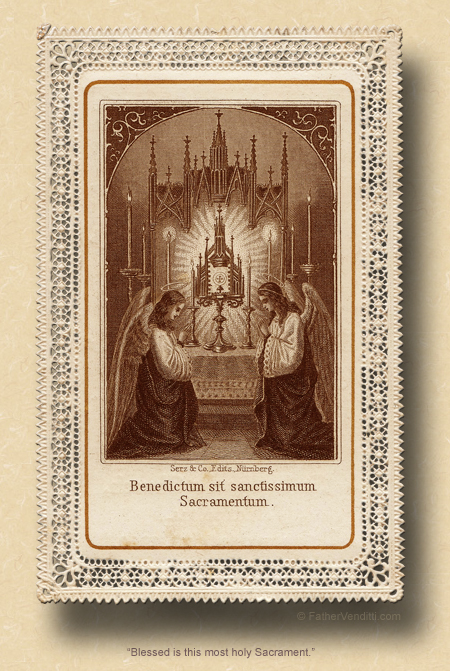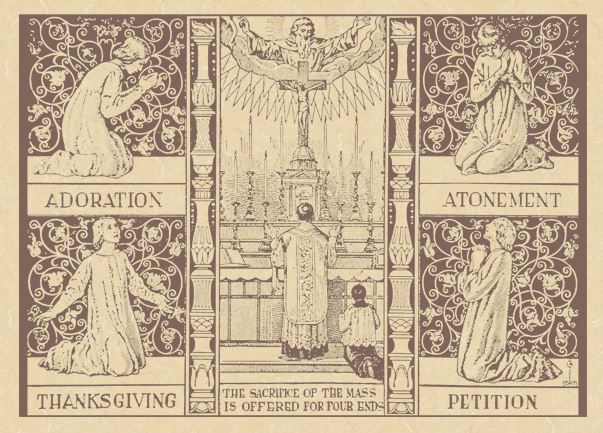The Eucharist Is Not a Sign or Symbol.
The Third Sunday of Easter.
Lessons from the secondary dominica, according to the ordinary form of the Roman Rite:
• Acts 3: 13-15, 17-19.
• Psalm 4: 2, 4, 7-9.
• I John 2: 1-5.
• Luke 24: 35-48.
The Second Sunday after Easter, known as Good Shepherd Sunday.
Lessons from the dominica, according to the extraordinary form of the Roman Rite:
• I Peter 2: 21-25.
• [The Gradual is omitted.]
• John 10: 11-16.
FatherVenditti.com
|
 9:07 AM 4/15/2018 — Those of you who attend Holy Mass every day will find today’s Gospel lesson familiar because the lessons presented for Holy Mass on these Sundays after Easter are often read on weekdays as well, and today's lesson was read back on Easter Thursday. It begins with the line: “The two disciples recounted what had taken place on the way, and how Jesus was made known to them in the breaking of the bread” (Luke 24: 34 NABRE). The incident referred to is that familiar one of Our Lord's encounter with the two disciples on the road to Emmaus, one of whom is named Cleopas, and the other not named. I’m sure the passage is familiar to you: how they do not recognize Our Risen Lord, how they recount for Him the story of Christ's betrayal, passion and death, marveling at how He would not know about such things. As they get near the city, Our Lord makes pretense of leaving them and continuing on, and they ask Him to stay with them; and, we observed at the time that Our Lord's pretending to want to leave them and continue on was His way of testing their desire to be with Him: if they want Him to stay with them, they're going to have to ask. Reflect how Our Lord does this to us all the time, allowing us, in His permissive will, to suffer wants and needs and deprivations in order to train us to depend on Him rather than on ourselves. 9:07 AM 4/15/2018 — Those of you who attend Holy Mass every day will find today’s Gospel lesson familiar because the lessons presented for Holy Mass on these Sundays after Easter are often read on weekdays as well, and today's lesson was read back on Easter Thursday. It begins with the line: “The two disciples recounted what had taken place on the way, and how Jesus was made known to them in the breaking of the bread” (Luke 24: 34 NABRE). The incident referred to is that familiar one of Our Lord's encounter with the two disciples on the road to Emmaus, one of whom is named Cleopas, and the other not named. I’m sure the passage is familiar to you: how they do not recognize Our Risen Lord, how they recount for Him the story of Christ's betrayal, passion and death, marveling at how He would not know about such things. As they get near the city, Our Lord makes pretense of leaving them and continuing on, and they ask Him to stay with them; and, we observed at the time that Our Lord's pretending to want to leave them and continue on was His way of testing their desire to be with Him: if they want Him to stay with them, they're going to have to ask. Reflect how Our Lord does this to us all the time, allowing us, in His permissive will, to suffer wants and needs and deprivations in order to train us to depend on Him rather than on ourselves.
He stays with these two disciples and, as Saint Luke puts it, He “broke bread” with them, which is Luke's subtle way of saying that He said Mass; and, it's in the context of this Mass, celebrated by Our Lord, that they recognize Him, at which point He immediately disappears. He disappears because, with the Blessed Sacrament now present, there is no need for Jesus in His human form to hang around anymore. Having received Our Lord in Holy Communion, these two then run off to Jerusalem to tell the Apostles what had happened; and, this is where today's Gospel lesson begins.
Now, I had also mentioned to those in attendance at daily Mass during Easter Week that most of those who encounter Our Lord after His resurrection are unable at first to recognize Him; not Mary Magdalene, not the other women, and not these two disciples He meets on the road to Emmaus … at least not until He offers the Holy Sacrifice of the Mass in their presence, whereupon He immediately vanishes because there is no need for two manifestations of Our Lord.  In today's Gospel lesson, which is also by Saint Luke, he appears for the first time to His Apostles and, oddly enough, they do recognize Him, so much so that they think they're seeing a ghost. Why are they able to see what no one else could see? Simple. They're priests. They have a relationship to Our Lord that no one else has; and, it's important to note that the Risen Lord does not do for them what he did for the disciples in Emmaus: He does not say Mass for them; He doesn't have to because this is something that they're able to do for themselves. In today's Gospel lesson, which is also by Saint Luke, he appears for the first time to His Apostles and, oddly enough, they do recognize Him, so much so that they think they're seeing a ghost. Why are they able to see what no one else could see? Simple. They're priests. They have a relationship to Our Lord that no one else has; and, it's important to note that the Risen Lord does not do for them what he did for the disciples in Emmaus: He does not say Mass for them; He doesn't have to because this is something that they're able to do for themselves.
It's just by way of emphasizing the fact that the relationship of the priest to Our Lord is different from the relationship of everyone else to Our Lord, which is why the Apostles are able to recognize Jesus after His resurrection when everyone else could not, and why our risen Lord, upon meeting the Apostles for the first time after rising from the dead, does not say Mass for them as He did for the disciples at Emmaus who were not priests.
But, priests or not, they are still men with all the weaknesses and temptations of men; their priesthood does not make them holier than anyone else, and it certainly doesn't make them any smarter, which is why even while recognizing Our Lord they are incredulous, and think they're seeing a ghost. So, what does He do? He eats a piece of fish. This is a significant act, because it illustrates the fact that Our Lord's resurrection from the dead was not something mystical or ethereal, and His risen presence was not some sort of heavenly projection: a heart muscle which had ceased to beat began to beat again; lungs which had become empty filled with air again; blood which had ceased to flow coursed through His veins once again. His body was a glorified one—a perfected one—but it was still the same body. The resurrection of Our Lord, God and Savior Jesus Christ is not a metaphor, and neither is the Eucharist we celebrate: it isn’t a sign of Jesus, it isn’t a symbol of Jesus, Jesus isn’t somehow present in the bread and wine; but, it truly is the Body, Blood, Soul and Divinity of Jesus Christ, only disguised as something else.
“O Lord, our God,” sings King David, “how glorious is your name over all the earth! What is man that you should be mindful of him, or the son of man that you should care for him?” (Psalm 8: 2, 5 NABRE). And what greater evidence of Our Lord's care for us than the gift of Himself in the Blessed Eucharist, and what further evidence than the fact that He gave the power to make the Eucharist happen to His apostles who, through the laying on of hands, passed that power on to other men down through the centuries.  The earliest evidence proves that, from the moment that they began to build churches, early Christians began to reserve the Blessed Sacrament in them because they wanted to pray before Our Lord in the tabernacle. And we know this from no less ancient a source than Saint John Chrysostom, who preached on Jesus entering the Temple in Jerusalem, saying, “This was proper to a good son: to enter immediately into the house of his Father to render due honor to Him there—just as you, who should imitate Jesus, whenever you enter a city should first of all go the church” (Catena Aurea, III). How wonderful would it be if we could resurrect the ancient custom of the Visit to the Blessed Sacrament? The earliest evidence proves that, from the moment that they began to build churches, early Christians began to reserve the Blessed Sacrament in them because they wanted to pray before Our Lord in the tabernacle. And we know this from no less ancient a source than Saint John Chrysostom, who preached on Jesus entering the Temple in Jerusalem, saying, “This was proper to a good son: to enter immediately into the house of his Father to render due honor to Him there—just as you, who should imitate Jesus, whenever you enter a city should first of all go the church” (Catena Aurea, III). How wonderful would it be if we could resurrect the ancient custom of the Visit to the Blessed Sacrament?
We do not need to envy the Apostles who saw and recognized the Lord after His resurrection; we see Him every day … on this altar … in this tabernacle. And we see Him because He gave to us priests with the ability to make Him present to us in the Holy Sacrifice of the Altar … just as present to us now as He was when He walked this earth as a man. That’s why when we’re at Holy Mass, we shouldn’t come forward to receive Holy Communion automatically without thinking, just because everybody else is. Communion is not just a symbol of unity. My soul needs to be properly disposed and free from serious sin in order for me to receive worthily; and, if it isn’t, then I need to refrain from receiving until I can confess to a priest.
In today’s Gospel lesson, Our Blessed Lord proves to his disciples the reality of His resurrection by eating in their presence. Let’s us reciprocate by proving to Him our firm belief that the Eucharist is our blessed Lord, by visiting Him in the tabernacle frequently, and always making sure our souls are prepared when we approach to receive Him.

|

